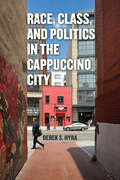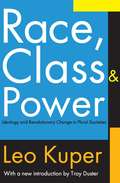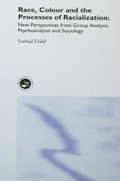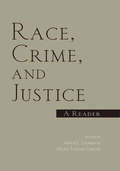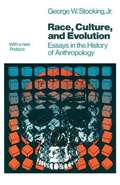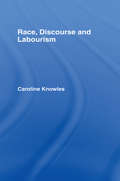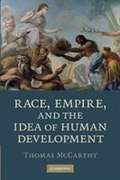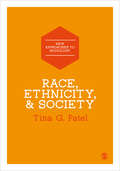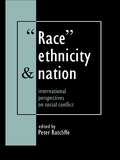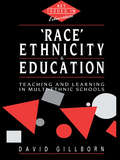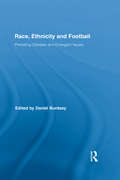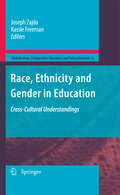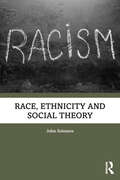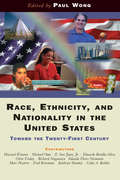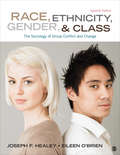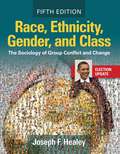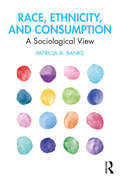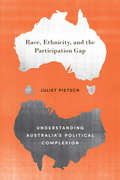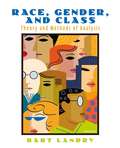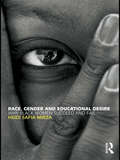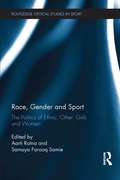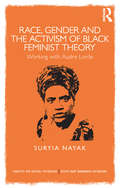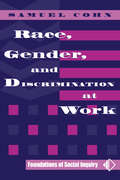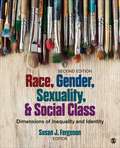- Table View
- List View
Race, Class, and Politics in the Cappuccino City
by Derek S. HyraFor long-time residents of Washington, DC’s Shaw/U Street, the neighborhood has become almost unrecognizable in recent years. Where the city’s most infamous open-air drug market once stood, a farmers’ market now sells grass-fed beef and homemade duck egg ravioli. On the corner where AM.PM carryout used to dish out soul food, a new establishment markets its $28 foie gras burger. Shaw is experiencing a dramatic transformation, from “ghetto” to “gilded ghetto,” where white newcomers are rehabbing homes, developing dog parks, and paving the way for a third wave coffee shop on nearly every block. Race, Class, and Politics in the Cappuccino City is an in-depth ethnography of this gilded ghetto. Derek S. Hyra captures here a quickly gentrifying space in which long-time black residents are joined, and variously displaced, by an influx of young, white, relatively wealthy, and/or gay professionals who, in part as a result of global economic forces and the recent development of central business districts, have returned to the cities earlier generations fled decades ago. As a result, America is witnessing the emergence of what Hyra calls “cappuccino cities.” A cappuccino has essentially the same ingredients as a cup of coffee with milk, but is considered upscale, and is double the price. In Hyra’s cappuccino city, the black inner-city neighborhood undergoes enormous transformations and becomes racially “lighter” and more expensive by the year.
Race, Class, and Power: Ideology and Revolutionary Change in Plural Societies
by Leo KuperExamining in detail the apparently inexorable polarization of society in such countries as Rwanda, Algeria, and South Africa, the author questions whether current theories correctly explain the past or offer adequate guides for the future. In their place he puts forward an alternative neo-Durkheimian view of the possibility of non-violent revolutionary change, based on the development of such social and cultural continuities as already exist within each plural society. But he warns that -this is an age of passionate commitment to violence in which vicarious killers abound in search of a Vietnam of their own.- The aim of this groundbreaking and challenging book is to create theoretical perspectives in which to view the racial conflict of plural societies. Written in the turbulent early 1970s, the book demonstrates the inadequacy of then prevailing views such as Marxist interpretations of racial conflict as class struggle, and the Fanon a priori rejection of non-violent techniques of change, which Kuper holds responsible for the acceptance of what he calls -the platitudes of violence.- The book concludes with more personal sections focusing on the author's struggles with the then prevailing South African society, critiques of that, and censorship of his attempts to make these public. In the light of subsequent changes in South Africa many decades later, this book serves not only as an important work of political sociology but as a personal testament to the fight against racism in South Africa. Leo Kuper was professor of sociology and director of the African Studies Center at the University of California, Los Angeles. A South African by birth, he was one of the first writers on genocide as well as other aspects of African studies and urban sociology. His major book, Genocide (Penguin, 1981), remains in print. The Leo Kuper Foundation is a non-governmental organization dedicated to the eradication of genocide through research, advice, and education. It was created in Washington, DC in 1994 following the death of Leo Kuper, with the aim of improving measures to prevent genocide. The main area of work for the past five years has been in support of the creation of an International Criminal Court. Troy Duster is director at the Institute for the History of the Production of Knowledge, New York University.
Race, Colour and the Processes of Racialization: New Perspectives from Group Analysis, Psychoanalysis and Sociology
by Farhad DalalIs racial conflict determined by biology or society?So many conflicts appear to be caused by racial and ethnic differences; for example, the cities of Britain and America are regularly affected by race riots. It is argued by socio-biologists and some schools of psychoanalysis that our instincts are programmed to hate those different to us by evolutionary and developmental mechanisms. This book argues against this line, proposing an alternative drawing on insights from diverse disciplines including anthropology, social psychology and linguistics, to give power-relations a critical explanatory role in the generation of hatreds. Farhad Dalal argues that people differentiate between races in order to make a distinction between the 'haves' and 'must-not-haves', and that this process is cognitive, emotional and political rather than biological. Examining the subject over the past thousand years, Race, Colour and the Processes of Racialisation covers:* psychoanalytic and other theories of racism* a new theorisation of racism based on group analytic theory* a general theory of difference based on the works of Fanon, Elias, Matte-Blanco and Foulkes* application of this theory to race and racism.Farhad Dalal concludes that the structures of society are reflected in the structures of the psyche, and both of these are colour coded. This book will be invaluable to students, academics and practitioners in the areas of psychoanalysis, group analysis, psychotherapy and counselling.
Race, Crime, and Justice: A Reader
by Shaun L. Gabbidon Helen Taylor GreeneA comprehensive collection of the essential writings on race and crime, this important Reader spans more than a century and clearly demonstrates the long-standing difficulties minorities have faced with the justice system. The editors skillfully draw on the classic work of such thinkers as W.E.B. DuBois and Gunnar Myrdal as well as the contemporary work of scholars such as Angela Davis, Joan Petersilia, John Hagen and Robert Sampson. This anthology also covers all of the major topics and issues from policing, courts, drugs and urban violence to inequality, racial profiling and capital punishment. This is required reading for courses in criminology and criminal justice, legal studies, sociology, social work and race.
Race, Culture, and Evolution: Essays in the History of Anthropology (With a new Preface)
by George W. StockingThe essays in this book are an attempt to answer a query posed by Oscar Handlin more than a decade ago in discussing Race and Nationality in American Life: "What Happened to Race?"
Race, Discourse and Labourism (International Library of Sociology)
by Caroline KnowlesRace, Discourse and Labourism argues that the commonwealth of socialism is founded upon a well-concealed history of brutality and repression. Caroline Knowles details the historical conditions of the emergence of race through Labour's dealings with Indian independence negotiations and anti-semitism in the thirties, and the effects of this on the conceptions of black citizenship, multi-racialism and black representation in labour politics.
Race, Empire, and the Idea of Human Development
by Thomas McCarthyThomas McCarthy analyzes the ideologies of race and empire that were integral to European-American expansion. He highlights the central role that conceptions of human development played in answering challenges to legitimacy through a hierarchical ordering of difference.
Race, Ethnicity & Society (New Approaches to Sociology)
by Tina G. PatelPart of the New Approaches to Sociology series, Race, Ethnicity & Society, expands on Tina Patel′s acclaimed book Race and Society. Offering a thoughtful and critically engaging exploration of some of the key issues around race and ethnicity in contemporary society, this book provides a nuanced and impactful perspective for students studying sociology. With a progressive approach that emphasises the social construction of race issues within a post-racial era, moving away from essentialist and polarized explanations of raced interaction, this book: Introduces the main concepts and key theories, including their post-developments Includes dedicated chapters on theorizing race and historical context Focuses on the processes and impact of racial categorisation in contemporary society Covers contemporary discussions related to #BlackLivesMatter and the Covid 19 pandemic Race, Ethnicity & Society is packed with topical examples and international case studies to engage students, along with chapter summaries, study questions and further reading. It′s a highly readable and thought-provoking guide to the study of race, ethnicity and society for students of sociology, criminology and related disciplines. Dr Tina G. Patel is a Senior Lecturer in Criminology at the University of Salford
Race, Ethnicity & Society (New Approaches to Sociology)
by Tina G. PatelPart of the New Approaches to Sociology series, Race, Ethnicity & Society, expands on Tina Patel′s acclaimed book Race and Society. Offering a thoughtful and critically engaging exploration of some of the key issues around race and ethnicity in contemporary society, this book provides a nuanced and impactful perspective for students studying sociology. With a progressive approach that emphasises the social construction of race issues within a post-racial era, moving away from essentialist and polarized explanations of raced interaction, this book: Introduces the main concepts and key theories, including their post-developments Includes dedicated chapters on theorizing race and historical context Focuses on the processes and impact of racial categorisation in contemporary society Covers contemporary discussions related to #BlackLivesMatter and the Covid 19 pandemic Race, Ethnicity & Society is packed with topical examples and international case studies to engage students, along with chapter summaries, study questions and further reading. It′s a highly readable and thought-provoking guide to the study of race, ethnicity and society for students of sociology, criminology and related disciplines. Dr Tina G. Patel is a Senior Lecturer in Criminology at the University of Salford
Race, Ethnicity And Nation: International Perspectives On Social Conflict
by Peter RatcliffeThis text offers an international and comparative analysis of social division rooted in race, ethnicity and national identity. It provides an overview of the key issues underlying ethnic conflict which has now risen to the top of the international political agenda.; This book is intended for academics, postgraduates and senior undergraduates within sociology, race and ethnicity, social anthropology, as well as those involved in other areas such as politics, geography, development studies and international relations with an interest in ethnicity.
Race, Ethnicity and Education: Teaching and Learning in Multi-Ethnic Schools (Key Issues in Education)
by David GillbornThis book is a major new investigation into the issues of 'race', ethnicity and education, following the educational reforms during the late 1980s. It provides an up-to-date and critical introduction to current issues and major research findings in the field, exploring the teacher-pupil relationship through a detailed account of life in an inner-city comprehensive. It reveals the influence of different racist stereotypes and highlights the especially disadvantaged position of Afro- Caribbean pupils within a school. Features: * Draws on a wide variety of research projects in ethnic schools to examine: achievement; curriculum content; language use; assessment and testing under the National Curriculum * Uses material collected during two years of research to consider young people's school experiences and issues relating to classroom discipline.
Race, Ethnicity and Football: Persisting Debates and Emergent Issues (Routledge Research in Sport, Culture and Society)
by Daniel BurdseyAs the first edited collection dedicated specifically to race, ethnicity and British football, this book brings together a range of academics, comprising both established commentators and up-and-coming voices. Combining theoretical and empirical contributions, the volume addresses a wide variety of topics such as the experiences of Muslims, the recruitment of African players, devolution and national identities, case studies of minority ethnic clubs, "mixed-race" players, multiculturalism and anti-racism, sectarianism, education, and covering the amateur and professional spheres, and focusing on both players and supporters, the book elucidates the linkages between race, ethnicity, gender and masculinity.
Race, Ethnicity and Gender in Education: Cross-cultural Understandings
by Joseph Zajda Kassie FreemanThis, the sixth volume in Springer's Globalisation, Comparative Education and Policy Research series, presents scholarly research on major discourses of race, ethnicity and gender in education. It is a sourcebook of ideas for researchers, practitioners and policy makers in education, globalisation, social justice, equity and access in schooling around the world. The aim of the book is to provide an easily accessible, practical yet scholarly source of information about issues of international concern in the field of globalisation and comparative education. Readers will also find here the very latest thinking on race, ethnicity and gender in the context of global culture. Editors Zajda and Freeman have compiled perspectives on education and policy research that are relevant to progressive pedagogy, social change and transformational educational reforms in the 21st century. The book critically examines the interplay between state, ideology and current discourses of race, ethnicity and gender in the global culture. It draws on recent research in the areas of globalisation, equity, social justice, and the role of the State. The authors also explore conceptual frameworks and methodological approaches that could be applied to research covering the State, globalisation, race, ethnicity and gender, and analyze existing inequalities due to race, ethnicity and gender and resultant social stratification. Finally, the book demonstrates the neo-liberal ideological imperatives of education and policy reform, affecting race, ethnicity and gender, and illustrates the way the relationship between the State and education policy affects current trends in education policy as well as reforms in the fields of race, ethnicity and gender.
Race, Ethnicity and Social Theory
by John SolomosRace, Ethnicity and Social Theory provides a critical analysis of the main areas of scholarly research and debate about racial and ethnic relations over the past few decades. The book covers substantive areas of scholarly debate in this fast-changing field, including race and social relations, identities and the construction of the racial other, feminism and race, the relationship between race and nationalism, antisemitism, the evolution of new forms of racism, race and political representation and, more generally, the changing debates about race and ethnicity in our global environment. The book argues that there is a need for more dialogue across national and conceptual boundaries about how to develop the theoretical tools needed to understand both the historical roots of contemporary forms of racialised social and political relations and the contemporary forms through which race is made and re-made. A key argument that runs through the book is the need to develop conceptual frameworks that can help us to make sense of the changing forms of racial and ethnic relations in contemporary societies. This means developing more dialogue across national research cultures as well as empirical research that seeks to engage with the key issues raised by contemporary theoretical debates. The book will be of interest to both students wanting to develop a deeper understanding of this area of scholarship and to researchers of race, ethnicity and migration working in various national and disciplinary environments.
Race, Ethnicity, And Nationality In The United States: Toward The Twenty-first Century
by Paul WongThis book is intended for use in advanced undergraduate and graduate-level courses on race and ethnicity and on diversity in America. It was first con- ceived as a collective project of the Research and Resident Scholar Program in Comparative Race Relations at Washington State University, which was established in 1994 with support from the Rockefeller Foundation. A number of the participating authors are established scholars in racial/ethnic studies, and several have published award-winning bestsellers. Others are relative newcomers to the field who were invited to join the project because they were doing important work on less well covered topics, such as relations between African Americans and Chicano/Latino Americans.
Race, Ethnicity, Gender, and Class: The Sociology of Group Conflict and Change
by Eileen O'Brien Joseph HealeyJoseph F. Healey and Eileen O'Brien's Race, Ethnicity, Gender, and Class, Seventh Edition once again uses sociological theory to tell the story of race and other socially constructed inequalities in the United States with consistency and clarity. Through a vivid writing style and engaging pedagogical features, the authors ensure that readers engage with core concepts in a meaningful way. Current Debates, based on the writings of prominent scholars, journalists, and commentators, spark classroom discussion on important issues. First-person accounts, Narrative Portraits, are threaded throughout the text to bring life to a variety of topics.
Race, Ethnicity, Gender, and Class: The Sociology of Group Conflict and Change (5th edition, Election Update)
by Joseph F. HealeyHealey (sociology, Christopher Newport U., Virginia) updates his textbook for undergraduate students, primarily but not exclusively those majoring in his discipline. He makes few assumptions about knowledge of history or sociological concepts. A unified set of themes and concepts links the multiple perspectives and on issues relating to minority groups in the US. This edition updates statistics, rearranges some of the text, adds and changes some visual elements, and provides a special report on the 2008 election. Chapters include debate questions, print and Web resources, questions for review and study, and an Internet research project. Annotation ©2009 Book News, Inc., Portland, OR (booknews.com)
Race, Ethnicity, and Consumption: A Sociological View
by Patricia A. BanksRace, Ethnicity, and Consumption: A Sociological View looks at the central concerns of consumer culture through the lens of race and ethnicity. Each chapter illustrates the connections between race, ethnicity, and consumption by focusing on a specific theme: identity, crossing cultures, marketing and advertising, neighborhoods, discrimination, and social activism. By exploring issues such as multicultural marketing, cultural appropriation, consumer racial profiling, urban food deserts, and racialized political consumerism, students, scholars, and other curious readers will gain insight on the ways that racial and ethnic boundaries shape, and are shaped by, consumption. This book goes beyond the typical treatments of race and ethnicity in introductory texts on consumption by not only providing a comprehensive overview of the major theories and concepts that sociologists use to make sense of consumption, race, and ethnicity, but also by examining these themes within distinctly contemporary contexts such as digital platforms and activism. Documenting the complexities and contradictions within consumer culture, Race, Ethnicity, and Consumption is an excellent text for sociology courses on consumers and consumption, race and ethnicity, the economy, and inequality. It will also be an informative resource for courses on consumer culture in the broader social sciences, marketing, and the humanities.
Race, Ethnicity, and the Participation Gap: Understanding Australia's Political Complexion (G - Reference, Information and Interdisciplinary Subjects)
by Juliet PietschRace, Ethnicity, and the Participation Gap begins with the argument that political institutions in settler and culturally diverse societies such as Australia, the United States, and Canada should mirror their culturally diverse populations. Compared to the United States and Canada, however, Australia has very low rates of immigrant and ethnic minority political representation in the Commonwealth Parliament, particularly in the House of Representatives. The overall existence of racial hierarchies within formal political institutions represents an inconsistency with the democratic ideals of representation and accountability in pluralist societies. Drawing on findings from the United States, Canada, and Australia, Juliet Pietsch reveals that the lack of political representation in Australia is significant when compared to the United States and Canada, revealing a serious democratic deficit. Her book is devoted to exploring this central puzzle: why is it that, despite having a similar history to other settler countries, Australia shows such comparatively low rates of political participation among its immigrant and ethnic minority populations from non-British and European backgrounds? In addressing this crucial question, Race, Ethnicity, and the Participation Gap examines the impact of Australia’s alternative path on the political representation of immigrants and ethnic minorities.
Race, Gender and Class: Theory and Methods of Analysis
by Bart LandryThis edited volume provides race, class, gender theory and detailed guidelines, strategies, and rules for the methodology of the Race, Class and Gender approach. It uses Intersection Theory to expose students to articles that employ the Race, Class, Gender approach.
Race, Gender and Educational Desire: Why black women succeed and fail
by Heidi Safia Mirza'This book is a great genealogy of black women's unrecognised contributions within both education and the wide social context. I think it constitutes an important piece of work that is totally missing from the existing literature' - Diane Reay, Professor of Education, Cambridge University Race, Gender and Educational Desire reveals the emotional and social consequences of gendered difference and racial division as experienced by black and ethnicised women teachers and students in schools and universities. It explores the intersectionality of race and gender in education, taking the topic in new, challenging directions and asking How does race and gender structure the experiences of black and ethnicised women in our places of learning and teaching? Why, in the context of endemic race and gender inequality, is there a persistent expression of educational desire among black and ethnicised women? Why is black and ethnicised female empowerment important in understanding the dynamics of wider social change? Social commentators, academics, policy makers and political activists have debated the causes of endemic gender and race inequalities in education for several decades. This important and timely book demonstrates the alternative power of a black feminist framework in illuminating the interconnections between race and gender and processes of educational inequality. Heidi Safia Mirza, a leading scholar in the field, takes us on a personal and political journey through the debates on black British feminism, genetics and the new racism, citizenship and black female cultures of resistance. Mirza addresses some of the most controversial issues that shape the black and ethnic female experience in school and higher education, such as multiculturalism, Islamophobia, diversity, race equality and equal opportunities Race, Gender and Educational Desire makes a plea for hope and optimism, arguing that black women's educational desire for themselves and their children embodies a feminised prospectus for a successful multicultural future. This book will be of particular interest to students, academics and researchers in the field of education, sociology of education, multicultural education and social policy. Heidi Safia Mirza is Professor of Equalities Studies in Education at the Institute of Education, University of London, and Director of the Centre for Rights, Equalities and Social Justice (CRESJ). She is also author of Young, Female and Black (Routledge).
Race, Gender and Sport: The Politics of Ethnic 'Other' Girls and Women (Routledge Critical Studies in Sport)
by Aarti Ratna Samaya F. SamieThe experiences of ethnic ‘Other’ females have – until recently – been widely overlooked in the study of sport. There continues to be a need to produce critical scholarship about ethnic 'Other' girls and women in sport and physical culture, in order to represent their complex, multifarious and dynamic lived realities. This international collection of critical essays provides compelling insight into the lived realities of ethnic ‘Other’ females in sport. Throughout the book, contributors either draw on the political consciousnesses of ‘Other’ feminisms, or privilege the voices of ethnic 'Other' girls and women so as to broaden, diversify and advance critical thinking pertaining to ethnic ‘Other’ females in sport and physical culture. The purpose of the collection is both to produce knowledge and privilege otherwise subjugated knowledges, which individually and collectively present counter-narratives that better speak to the lived realities of racially oppressed groups of women and girls. Race, Gender and Sport: The Politics of Ethnic 'Other' Girls and Women is important reading for all students and scholars with an interest in the sociology of sport, gender studies, or race and ethnicity studies.
Race, Gender and the Activism of Black Feminist Theory: Working with Audre Lorde (Concepts for Critical Psychology)
by Suryia NayakBeginning from the premise that psychology needs to be questioned, dismantled and new perspectives brought to the table in order to produce alternative solutions, this book takes an unusual transdisciplinary step into the activism of Black feminist theory. The author, Suryia Nayak, presents a close reading of Audre Lorde and other related scholars to demonstrate how the activism of Black feminist theory is concerned with issues central to radical critical thinking and practice, such as identity, alienation, trauma, loss, the position and constitution of individuals within relationships, the family, community and society. Nayak reveals how Black feminist theory seeks to address issues that are also a core concern of critical psychology, including individualism, essentialism and normalization. Her work grapples with several issues at the heart of key contemporary debates concerning methodology, identity, difference, race and gender. Using a powerful line of argument, the book weaves these themes together to show how the activism of Black feminist theory in general, and the work of Audre Lorde in particular, can be used to effect social change in response to the damaging psychological impact of oppressive social constructions. Race, Gender and the Activism of Black Feminist Theory will be of great interest to advanced students, researchers, political activist and practitioners in psychology, counselling, psychotherapy, mental health, social work and community development.
Race, Gender, And Discrimination At Work
by Samuel CohnRace, Gender, and Discrimination at Work is a review of the determinants of wage and employment discrimination by firms against minorities and women. Aimed at sociology undergraduates, the book assumes no pre-existing social scientific knowledge. Downplaying family and cultural factors in favour of an analysis of the roles played by organizational,
Race, Gender, Sexuality, And Social Class: Dimensions Of Inequality And Identity
by Susan J. FergusonAn eye-opening exploration of how socials statuses intersect to shape our identities and produce inequalities. In this fully edited and streamlined Race, Gender, Sexuality, and Social Class: Dimensions of Inequality and Identity, Second Edition, Susan Ferguson has carefully selected readings that open readers’ eyes to the ways that social statuses shape our experiences and impact our life chances. The anthology represents many of the leading voices in the field and reflects the many approaches used by scholars and researchers to understand this important and evolving subject. The anthology is organized around broad topics (Identity, Power and Privilege, Social Institutions, etc.), rather than categories of difference (Race, Gender, Class, Sexuality) to underscore this fundamental insight: race, class, gender, and sexuality do not exist in isolation; they often intersect with one another to produce social inequalities and form the bases of our identities in society.
